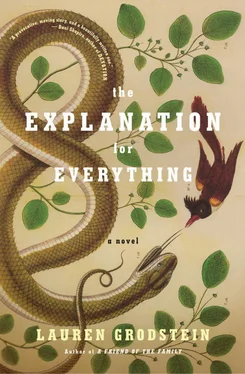As the years went on, the Lims sold fewer cans of tomatoes, more boxes of organic soy milk, and continued to do a brisk trade in cat food, toilet paper, and soap. They remembered their customers’ names and preferences, never ran out of Progresso chicken noodle for Chris and Julie Butler’s boys, never ran out of energy bars for Catherine Marcello, the marathoner. They had fresh flowers out front, seasonal and expensive, and a wide variety of craft and regional beers in the coolers in the back.
The Lims lived in an apartment above the store, which they had secured, rent-controlled, for three hundred dollars a month when they moved to Brooklyn from Pusan, and which they eventually bought when their landlord, a cranky old Italian, announced a sudden and hasty move to North Carolina in 1982. What was he going to North Carolina for? The Lims never found out, but they rallied their family in Korea, took out some loans, bought the building, watched its value rise precipitously during the first years of the century, and paid back their family with interest.
In 1979 and ’80 they had their children, who, because the Lims themselves were always working, seemed to grow up in the store, between the shelves of soup and the shelves of macaroni. Eddie and Anita attended the public school down the block from the store when the school wasn’t considered particularly good, and attended the Bethany Presbyterian Church in Sunset Park even though there was a bigger, fancier Korean church in Manhattan. But the Lims liked Bethany, its homey feel, its pastor practically an old neighbor from Pusan. Eddie, their elder child, did them proud by believing the Word of God. Anita, on the other hand, did not believe, and in fact often refused to go to church at all, but although this rejection made her parents sad they agreed with each other, at night, when Anita’s light still burned from behind her bedroom door—my goodness, how many hours could that girl study without wearing out her eyes?—that she was such a marvelous daughter, such a credit to them in so many ways, that truly they could not be too saddened by her. Besides, were they really going to force her to go to church when all she wanted was to play the cello, play tennis, study biology, study chemistry, write short stories, and win so many high school prizes and medals that her father actually built her a trophy case for her room? Were they really going to complain about a daughter whose teachers called home not just occasionally but on a regular basis to exclaim that they’d never met a kid quite like her, so articulate, so self-possessed, so conscientious, so very, very brilliant?
Some Sundays other churchgoers wondered out loud, “So where is your Anita this morning?” Well, usually she was traveling to Washington DC for her model UN or perfecting her experiment for the Intel Science Talent Search or playing cello in France with the International Youth Symphony. Eventually the other churchgoers grew sick of hearing about Anita and left the Lims in peace.
Had Mrs. Lim felt truly connected to any of the ladies at church, the ones who masked their jealousy with probing questions, she might have said: “I do not wish that Anita were here at church by my side so she could walk with God. I wish she were here so that I could spend some time with my daughter.” It was her fondest secret that she wanted the kind of relationship she suspected American women had with their daughters, the kind where they shopped together for shoes or went out for lunch at restaurants in Manhattan. This was foolish, she knew, but it was still what she longed for, and if she couldn’t have that (there were a million reasons why she would never have that) she would settle for church, for Anita sitting at her side the way that Jackie Park sat next to Mun-hee Park and Casey Rho sat next to Soo Rho.
Nevertheless, despite these quiet disappointments, the Lim family prospered in a general American way. They bought a car. They perfected their English, although they still preferred reading newspapers and watching movies in Korean. They replaced their car with a nicer car, installed air-conditioning and a high-tech security system in their store. They lamented that Eddie was not quite the student his sister was, but still he graduated from high school and gained admission to Hunter College and the Lims were delighted to send him there and hang a Hunter bumper sticker on the wall of pride next to their shop’s front door, where it joined the photo of Reagan and also Bushes I and II, a signed portrait of Billy Graham, and postcards from customers’ travels around the world.
A year later, when Anita graduated as Stuyvesant’s valedictorian and headed off to Harvard, Mrs. Lim worried about whether or not she should place a Harvard bumper sticker near the Hunter one on their wall. She didn’t want to embarrass Eddie; moreover, she didn’t want their customers to think she was a braggart. She had already received innumerable e-mails of congratulations from distant cousins in Korea, and her sister back in Pusan told her that their mother, practically deaf, practically bald, subsiding on nothing but tea and gruel, had smiled her first smile of the month upon hearing the news. Harvard!
In typical Anita style, the girl herself was sanguine about the whole thing; she liked Harvard but she’d also liked Stanford and MIT and Yale, and only chose the former because their financial aid package was comprised mostly of grants instead of loans.
So Anita went to Harvard, and Eddie went to Hunter, and the Lims stocked Seventh Generation diapers and coconut water and baked seitan in their store, and found themselves, against all expectations, having detailed conversations about Korean food with almost obnoxiously knowledgeable white kids from the neighborhood who wanted Mrs. Lim’s take on their home-brewed kimchi or crispy handmade squid pancake. Mrs. Lim asked Anita, on the phone, what it was with these white kids.
“They’re called foodies, Mom,” said Anita, far away in Cambridge, sounding as distracted as ever. “They’re looking for authentic food experiences.”
“Why don’t they make their own authentic food?” Mrs. Lim wondered.
“They don’t have any,” Anita said. But Mrs. Lim knew this wasn’t true, because her own children had raised themselves on white food whenever she turned her back; until they left the house, she hadn’t realized how much pizza they used to eat, how much spaghetti, how many (grimace) turkey sandwiches. Now that they were gone, Eddie in an apartment with some roommates on the Upper East Side, Anita in Cambridge, she and her husband ate omelets or English muffins or nothing at all. They drank endless cups of coffee, like real Americans.
“Anita? Will you be coming home for Thanksgiving?”
“I don’t know, Mom. I have so much work to do.”
“Maybe we’ll come up there? We could bring Eddie?”
“I guess,” Anita said. “But don’t you have to work?”
Another fond secret—Thanksgiving was Mrs. Lim’s favorite holiday. More than Christmas, more even, God forgive her, than Easter. Her old Italian landlord had taught her to make pumpkin pie with ricotta in it and the kids ate it up every year, even her husband asked for seconds, and then they would watch football together on the television, the one game of the year they watched, Eddie explaining everything, play by play.
“So we’ll come up to Cambridge then,” Mrs. Lim said.
“God, Mom, I don’t know, let me check my schedule, okay?”
Mrs. Lim imagined, across the country, American daughters helping their mothers bake pies.
“What are you so busy with, anyway?”
“Um, I don’t know, only everything?”
“Come on, Hae Sun. Tell me.”
“Graduate school applications, midterms, GREs, everything.”
“GRE?”
Читать дальше












